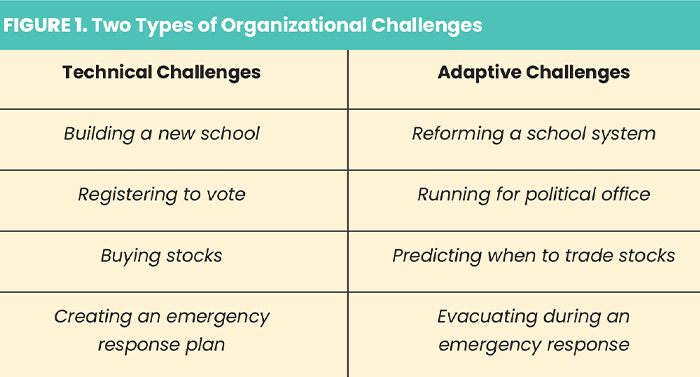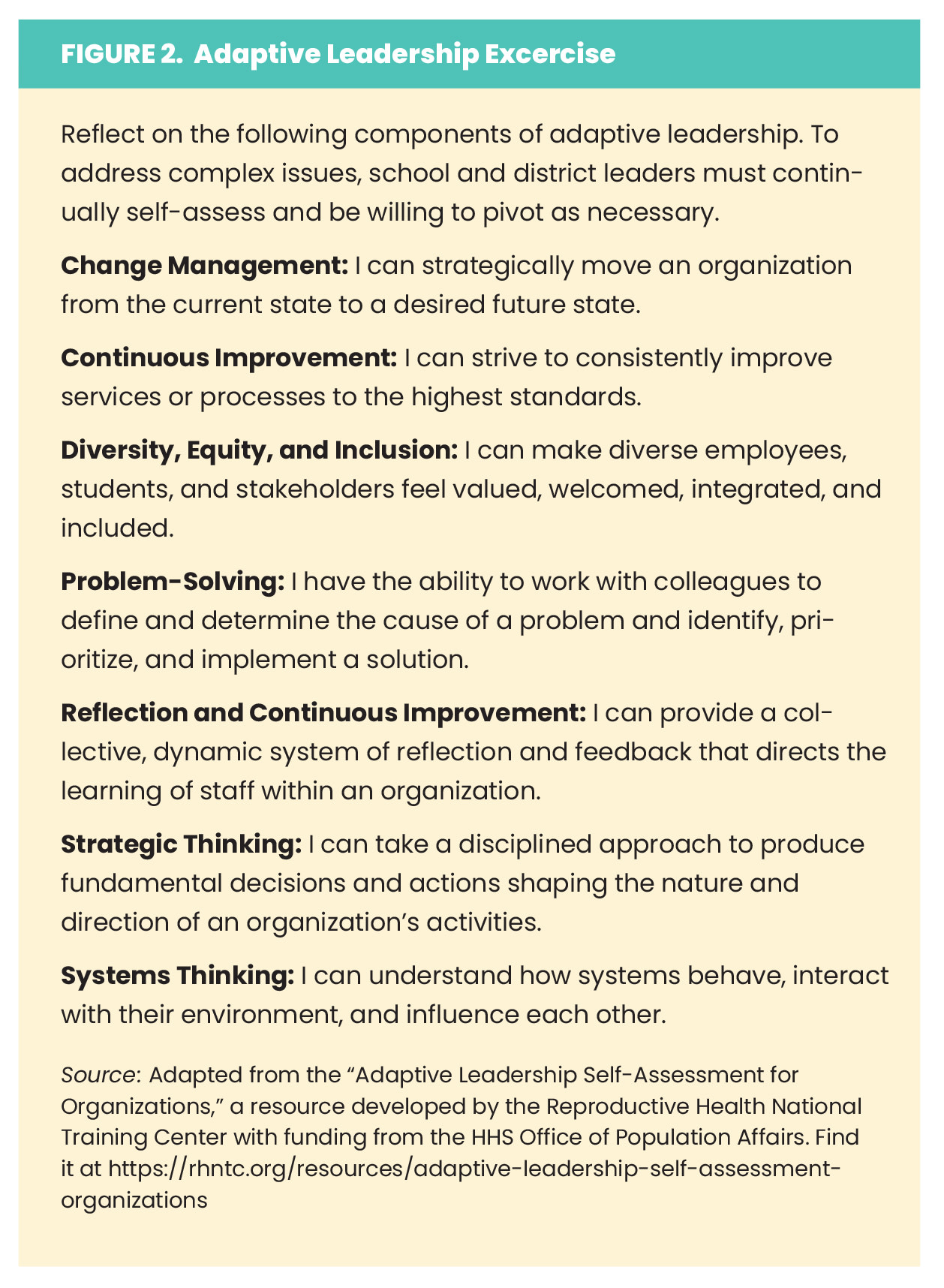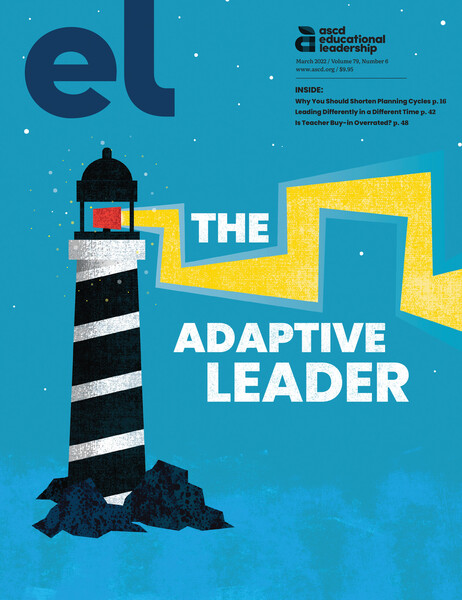With the return to in-person instruction this school year, educators are addressing several new and old challenges, including persistent inequities, large class size, technological changes, instructional "loss," parent involvement, student and staff health, and student behavior. These challenges, both individually and collectively, have only been exacerbated by the COVID-19 pandemic. Why is it that they continue to pose such a threat to school progress?
Often, school leaders don't have a clear, integrated method for addressing such challenges—which can add confusion to what are already complex issues. To make progress, schools—and all organizations for that matter—need to adopt a problem-solving philosophy to ensure that challenges are being interpreted the same way by all employees and that structures are in place to address them systemically. Adaptive leadership is a research-based approach to problem-solving that can help schools accomplish this. It keeps the most challenging issues at the forefront and increases a team's confidence in being able to address them.
Cambridge Leadership Associates, an organization that grew out of the work of Ronald Heifetz, a leadership expert at Harvard University and codeveloper of the adaptive leadership framework, explains it succinctly:
Adaptive leadership is a practical leadership framework that helps individuals and organizations adapt and thrive in challenging environments. It is being able, both individually and collectively, to take on the gradual but meaningful process of change. It is about diagnosing the essential from the expendable and bringing about a real challenge to the status quo. (Cambridge Leadership Associates, n.d.)
The Nuts and Bolts
In education, adaptive leadership is about adopting a growth mindset to build the capacity and resilience of all educators, especially school and district leaders, to address complex organizational challenges. It is about looking beyond our own ambition as educators and leading in a way that encourages change for the better in our organizations.
A key ingredient to adaptive leadership is being consciously aware of how adults learn. According to professional learning scholar Ellie Drago-Severson, understanding adult development "increases our cognitive, affective (emotional), interpersonal, and intrapersonal capacities that enable us to manage better the complex demands of teaching, learning, leadership, and life" (2008). Drago-Severson explains that there are specific ways of knowing and understanding information, as described in Kegan's constructive-developmental theory: (a) "We actively make sense of our experiences (constructivism)"; and (b) "The ways we make meaning of our experiences can change—grow more complex—over time (developmentalism)."
In other words, when a school decides to address a complex challenge, leaders should take into account questions like, How does my organization learn? How do each of the adults in my organization learn? Does the person who usually needs to ask several questions have the space to ask them? Does the person who sits quietly while they process have the time to do so before being asked to execute? Will the information be provided in a variety of formats (written, large group, small group, and/or one-on-one) to allow staff members to construct and develop their respective new meaning?
Adaptive leadership is a transformational capacity-building process that can not only improve the lives of teachers and employees but also the entire district—and it can affect student outcomes. In my work as an ASCD faculty member, I have coached school districts across the country—including Houston Independent School District in Texas, Columbia Public Schools in Mississippi, and Jericho Union in New York—to identify challenging system issues that are most pressing to their schools, as well as to address the ongoing impact of the pandemic. Though each district approached their challenges differently based on size and geographic location, at the core of each "right answer" stood a willingness to deeply shift the culture.
Adaptive challenges are based on the premise that everyone is a part of the problem, and everyone must be a part of the solution.
The key to adopting an adaptive philosophy is to understand and commit to the realization that the way the challenge has evolved in the organization is related to the actions and responses of the people in the organization and it will be solved by their collective commitment to changing their attitudes, beliefs, and behaviors. Understanding the difference between the types of challenges that are presented is fundamental to properly addressing them.
Technical and Adaptive Challenges
Your school will encounter two types of challenges: technical challenges and adaptive challenges. Technical challenges are simple and predictable: they can typically be solved with existing expertise because the problem, definition, solution, and implementation are clear. Adaptive challenges, on the other hand, cannot. They require innovation in the collective mindset of all staff, as well as an intellectual and emotional commitment to change. As noted, adaptive challenges are based on the premise that everyone is a part of the problem, and everyone must be a part of the solution. When adaptive challenges go unaddressed, especially those relating to inequities, they can have a devastating impact on a school or district.
Figure 1 provides clarity on the difference between these two challenges.
From Challenge to Change
So how does change actually happen? To create lasting change in our schools, leaders need an adaptive lens, an ability to adjust inequitable policies and conditions with flexibility to create the best outcomes for staff and students. Our schools operate within fixed systems that often lack responsiveness—like grading systems, for example. When students do not meet the "passing" or "proficient" mark, there are typically not universal processes in place to intervene, especially when the results of those systems are inequitable. We have a plethora of data showing learning gaps among students of color, students from low socioeconomic households, and students with special needs. Yet we send these students the harmful message that if they do not learn something the first time, they are on their own to figure it out. Our own fixed mindsets can inadvertently reinforce that there is only one right answer, a single path forward. Seeing systems as "immovable" washes educators' hands of accountability.
Through adaptive leadership, by contrast, you can build the capacity of the people in your organization to feel comfortable in not always having the answer. Adaptive leadership teaches teams to be OK not having a finite conclusion to the current problem, but instead to see the problem as a priority for aggressive continuous learning and growth.
Simply put, adaptive leadership means leading in a way that encourages and allows the people in your organization to adapt flexibly and productively to the most complex challenges, while holding them and yourself accountable to the outcomes. It's seeking out those opportunities to grow as an organization and applying the adaptive components (see Figure 2) to challenges that will produce sustained change.
The Adaptive Leadership Recipe
To start on the path to adaptive leadership, you need to create a climate for change by adopting a bold and ambitious vision to address a complex challenge, like tackling issues around diversity, equity, and inclusion (DEI). DEI work is one of the most pressing areas where I see schools falter. Sending a letter out to the community in support of Black Lives Matter, for example, won't fix the prejudice and bias that permeate our school systems. Tackling inequities, like those rampant in school discipline policies, requires leaders to become more vigilant and focused on what is eroding their schools from the inside out. Leaders must commit to creating systems and policies that protect vulnerable students and hold themselves and staff accountable for equitable outcomes.
I use the following operational definition of equity: the state, quality, or ideal of being just, impartial, fair, seen, and heard. To me, the concept of equity is synonymous with fairness and justice; therefore, equity needs to be thought of as a structural and systemic concept. Schools that make the commitment to equity throughout their organization consistently address challenges and gaps by creating systems that attend to the following questions:
What do our policies aim to do? Do policies indicate who is to benefit? Who is left out?
What are the taken-for-granted assumptions made about students and teachers within our policies? In what ways might the taken-for-granted assumptions impact equity?
How do we make equity intentional rather than accidental?
How do we invite reflection on the ways that we, as schools or districts, can advance equity? (Landrieu & Maierhofer, 2019)
It is not enough just to answer these questions, however; schools must act upon the responses gathered to revise systems and reallocate resources to implement the necessary changes to bring about transformational school experiences.
The next step in adaptive leadership is to select a change process like John Kotter's "Eight-Step Process for Leading Change":
Create a sense of urgency.
Form a guiding coalition.
Create a strategic vision.
Initiate change.
Remove barriers to change.
Generate short-term wins.
Make change a continuous process.
Incorporate change in the organizational culture (Kotter, 1996).
When adaptive leadership is implemented with fidelity, leaders will be able to determine the degree of their school or district's readiness for change. Once you have a working climate that is ripe for transformation, it's time to engage in capacity building. To do this, you must communicate your vision, empower people into action, and attack those quick wins, such as setting a goal for adults in the school to learn the first and last names of all students in the building within the first 30 days of the start of classes. With such moves in place early on, you can implement and ultimately sustain change. In time, the change process will be embedded in your school or district's culture and will build the capacity of staff to problem-solve throughout the organization.
To effectively implement, manage, and sustain any change initiative, leaders also need to adopt a reflective process to assess how they will address the proposed challenge; how they will monitor the progress and adjust while implementing the change; and how they will determine if the outcomes they intended to produce are evident. They can self-assess and evaluate the progress of leading the adaptive challenge by using Figure 2 as a reflective exercise.
The "Bloodline" of Adaptive Leadership
There is one caveat to this work: Without an equity lens, you cannot effectively address adaptive challenges in your organization. Equity, especially in terms of understanding what staff members need to succeed, is the bloodline of adaptive leadership work.
Leaders must understand that everyone is starting from a different place. Because of this, approaching the support of each staff member in different ways is fundamental to individual and organizational success. An equitable environment is one where people feel emotionally, physically, and psychologically safe. Creating protocols and procedures for staff to define this for themselves is paramount.
One way that leaders can create this space in their schools is by making time to check in with their direct reports. They should meet with administrators at least weekly and, depending on the size of the school, meet with teachers monthly or twice a semester. These 15- to 30-minute check-ins give leaders a sense of how each staff member is doing personally and professionally.
So, before your adaptive leadership journey begins, you must do the foundational work of investigating where you and your team members are in context of your school environment. The information you gather from staff check-ins will guide you in determining a starting point that makes sense for the growth and development of the team. It's not enough to assume where you and your team are—assess, seek evidence, and act!
Adaptive Leadership, Savvy Leadership
There is no question that leading schools is a daunting task, but I have never met an educator who wanted to do the job because they thought it would be easy. The best leaders challenge themselves to tackle the most difficult issues their students and staff face, and they evaluate their performance based on their ability to solve problems for those stakeholders. So, be bold and challenge yourself, your school, and your district to tackle the most pressing obstacles you face. Communicate your goals to everyone to ensure that your stakeholders know what you're doing and how you plan to move forward. Finally, above all else, be truly honest, transparent, and accountable for the results.
As Paulo Freire once stated: "Education … is the practice of freedom, the means by which men and women deal critically and creatively with reality and discover how to participate in their transformation of the world" (1970).
Now, go be great!
Reflect and Discuss
➛ Can you think of a persistent adaptive challenge in your school or district? What organizational factors have stood in the way of resolving it?
➛ Why is understanding how adults learn necessary to building staff capacity to address complex challenges?
➛ How could you instill more growth mindset and flexibility in your school's problem-solving processes?









